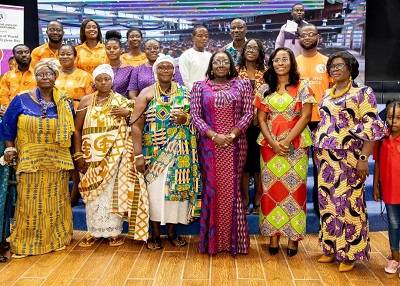
The wife of the Asantehene, Lady Julia Osei Tutu, has advised against stigmatising menstruation in any form, to allow girls stay in school and realise their aspirations.
According to her, incidences of ridicule, lack of access to water, sanitation and hygiene (WASH) facilities, lack of safe spaces, low knowledge and high cost of sanitary products, among other barriers to menstrual hygiene, had greater impact on girls’ education if not urgently tackled.
“Menstruation is what makes us who we are as women. It is something that should not be stigmatised in any way because it is an important physiological step in every young girl’s life and we must take it seriously.
“Without the right information and facilities girls will continue to get distracted from school and from reaching the heights they want to attain,” she observed.
Lady Julia was speaking at a “Menstrual Hygiene and Sexual Abuse Talk” for girls drawn from selected basic and second cycle schools in the Greater Accra Region.
Organised by Touching the Lives of Girls Foundation International, a non-governmental organisation, the forum was to climax a month-long campaign to mark this year’s Menstrual Hygiene Day.
In its sixth year, the annual campaign, which seeks to demystify menstruation and empower young girls reached out to about 6,000 girls across the country this year, providing them with sanitary towels as well.
Lady Julia who is also patron of the foundation, encouraged continued advocacy on menstrual hygiene across all levels of society to create the needed environment for women and girls to achieve their goals without any hindrance.
That, she added, was also important to bridge the prevailing gender inequality gap in the country.
“The conversations and advocacy must continue. We must continue to give girls access to safe menstrual hygiene methods. Schools must have safe places for girls to change, possibly have pads available to enable girls stay in school during their periods,” she urged.
The wife of the Asantehene advised young girls to stay focused and not be deterred by life challenges in order to achieve their dreams in life.
An Obstetrician and Gynaecologist, Dr John Kwamina Bosomtwe, called for open conversations around menstruation for both boys and girls for better management.
“The challenges around menstrual hygiene will need collective efforts to address and we need to rope in boys and men into the conversation. Menstruation is essential for women’s reproductive health,” he stated.
Founder of the NGO, Nana Ama Adutwumwaa, expressed concern over deep-rooted taboos and cultures that hinder proper menstrual hygiene and could expose girls to long-term health complications.
She implored traditional rulers, community and religious leaders as well as all well-meaning Ghanaians to support the advocacy on menstruation to break the myths around it and improve girls’ well-being while helping them attain their goals.
According to the United Nations, around 1.8 billion people menstruate every month worldwide, meaning at a given point each day, 800 million women and girls menstruate, comprising 26 per cent of the global population.
By ABIGAIL ANNOH







